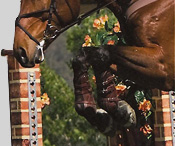



PROVIDING THE BEST
CARE FOR YOUR OLDER HORSE
An American Association of Equine Practitioners Publication

10 Tips for Caring for the Older Horse
Because of advances in nutrition, management and health care, horses are living longer, more useful lives. It’s not uncommon to find horses and ponies living well into their 20s and 30s. While genetics play a role in determining life span, you too, can have an impact.
You may think that turning your old-timer out to pasture is the kindest form of retirement. But horses are individuals. Some enjoy being idle; others prefer to be a part of the action. Whatever you do, don’t ignore the horse. Proper nutrition, care and exercise will help the animal thrive. Follow these guidelines to develop a total management plan for your older horse:
- Observe your horse on a regular basis. Watch for changes in body condition, behavior and attitude. Address problems, even seemingly minor ones, right away.
- Feed a high quality diet. Avoid dusty and moldy feeds.
- Feed your older horse away from younger, more aggressive ones so it won’t have to compete for feed.
- Feed at more frequent intervals so as not to upset the digestive system. Two-three times daily is best.
- Provide plenty of fresh, clean, tepid water. Excessively cold water reduces consumption which can lead to colic and other problems.
- Adjust and balance rations to maintain proper body conditions.
- A good rule of thumb is to be
able to feel the ribs but not see them. - Provide adequate, appropriate exercise to maintain muscle tone, flexibility and mobility.
- Groom your horse frequently to promote circulation and skin health.
- Be aware that older horses are prone to tumors. Look for any unusual lumps or growths from head to tail as well as beneath the tail (especially on gray horses).
- Schedule routine checkups with your equine veterinarian. Call immediately if you suspect a problem.
A quick response to ailments, injuries or a decline in fitness can keep your older horse from having a serious or prolonged setback. That means less worry for you and a better quality of life for your old friend. For more information about caring for the older horse, ask your equine veterinarian for the “Older Horse” brochure, provided by the American Association of Equine Practitioners in partnership with Educational Partners Bayer Animal Health and Purina Mills, Inc. Visit the AAEP’s horse health web site, www.myHorseMatters.com, for additional information about caring for the older horse.
Reprinted with permission from the American Association of Equine Practitioners.
PO BOX 60730
RENO NV 89506
EMERGENCY (775) 742-2823 OFFICE (775) 969-3495
FAX (775) 969-3923





